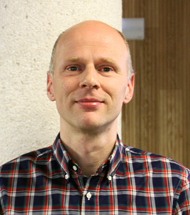"The link between Islam and terrorism in the public sphere has driven Muslims away from it to manifest their beliefs."
December 10 is Human Rights Day and Lasse Thomassen, from Queen Mary University, spoke at the University of Navarra about one of them, religious freedom.

PHOTO: Natalia Rouzaut
"Due to the link between Islam and terrorism that exists in the discourse of the public sphere, Muslims are moving away from it when it comes to expressing their beliefs," said Lasse Thomassen, researcher of Queen Mary University, at the University of Navarra. The expert has given a seminar of the project 'Religion and Civil Society' of the Institute for Culture and Society (ICS) on religious freedom in the European Court of Human Rights.
On framework Human Rights Day, which is celebrated on December 10, he recalled that one of the fundamental rights of all people is freedom of religion, as stated in article 9 of the European Convention on Human Rights.
He explained that the text is divided into two parts: the first affirms absolute freedom, while the second stipulates the instructions to limit this freedom "on the basis of public order and concern for the rights and freedoms of others," he said.
Thomassen added that one might think that this right is in some danger due to the terrorist attacks of recent years: "This is mainly due to the associations that are often made between Islam, political Islam, extremist forms of Islam and terrorism, which are contingent links, but which are often presented as necessary or natural".
This association of concepts poses, in his opinion, a danger: "States try to restrict the threats of terrorism and monitor Muslims and limit their freedom to be Muslims".
Prohibition of ostentatious religious symbolsAnother current discussion regarding religious freedom focuses on the banning of conspicuous religious symbols in French public schools: "This has led to Muslim children having their rights restricted. In fact, some of these cases have reached the European Court of Human Rights."
According to him, another question core topic is "whether it is better for freedom if religions are equally excluded from public spheres, or if they are all equally included in that space".
He considers that the first status, which is the case in France, affects religions differently because "each one conceives in a different way the relationship between belief and internship, between private and public, between religion and State". On the other hand, in the second case, which is that of the United Kingdom, he mentioned the risk of "a dominant and majority religion establishing itself as rule ".
Regarding the place of religious freedom, Thomassen commented that today we are experiencing a religious renaissance: "On the one hand, society is becoming more and more secularized, fewer and fewer people identify themselves as religious. But on the other hand, there is a lot of talk about religion, it is very present in public spaces, especially in the media".
